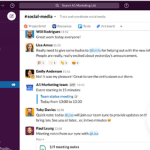A number of huge companies, like Google, Publicis Groupe, Intel, Shopify and now also Salesforce, have publicly announced their employees will continue to work from home well into 2021. Many smaller companies are taking these companies’ leads. And many of these companies have been surprised at how productive their workforce has been from home, so they’re planning to integrate WFH even after the pandemic is said and done. So it’s crystal clear that working from home will dominate the workplace for the indeterminate future. But —as many of us have experienced — all this at-home productivity has some major downsides.
Those who live with roommates in smaller city apartments have to cope with being together 24/7 and find some way to carve out a workspace that’s conducive to productivity. Others have to balance their workday with parenting and teaching their kids. Despite the glories of working in pajama pants, things —for the most part —are hectic. Zoom is our connection to the outside world. We wear the same three shirts over and over again. And Zoom fatigue is a force to contend with every day.
We know there’s no turning back to the office-first mentality of 2019, so it’s time to make the best of your new home-based office. Karen Mangia, Salesforce’s vice president of customer and market insights and the author of the new book, “Working From Home: Making the New Normal Work For You,” set for release Aug 25, offers up five excellent tips to help you win at working from home.
“The way you started working from home isn’t what you have to sustain”
Define what success means to you in this environment
Success means different things to different people, but one thing many of us have in common is we like to say, “If only.” As in, “If only I didn’t have to commute, I could exercise more” or “If only I didn’t have people popping by my office, I could get more done.” Now that we’re working from home, you don’t have a commute and, in theory, no one is stopping by your desk. So why aren’t you super fit and totally organised?
Mangia advises not to set yourself up for failure, but to set realistic success goals for yourself. So how you measure your success and define your own time is truly up to you.
“Knowing what success looks like for you is the best filter for how and where you spend your time, energy, and resources,” she says. “Without a clear definition of success, you’ll never achieve it. Success will be an outcome that’s always out there somewhere. It’s one you’re always chasing and can never reach, which starts a dangerous talk track about self worth.”
Mangia adds that success might be a five-minute daily meditation. Or maybe it’s maintaining a sense of style or finding new office allies.
Keep what works. Adjust what doesn’t
When we started working from home, we used whatever tools we had at our disposal: a stiff chair; cramped desk; wired earbuds. Over time, you realised that chair and desk? Not so comfortable. The earbuds? Not great for your back-to-back-to-back Zoom meetings. And let’s be honest, the lighting wasn’t wonderful and you forgot to factor in time for a proper lunch and some exercise. So change things up. Create your best space possible and learn to take some time for self care. “The way you started working from home isn’t what you have to sustain.” The beauty of having your own space is just that: Make it your own.
Set rituals, routines, and boundaries
Once upon a time you went to an office. Now you walk down the hall. You used to go to the gym early, read a book or listen to a podcast on your commute, meet a friend for a morning coffee. You had routines. You had rituals. And let’s be honest, going to the office allowed you to have boundaries between work and home. Now it’s all in one place. Mangia’s advice: Break. It. Up.

“When you commuted, you were able to get into that headspace to get ready for your day,” Mangia says. “When you went home, you transitioned from work. So think about the rituals, routines, and boundaries that put you at your best.” With working from home, you could easily keep working. Make sure you make time for yourself and your family.
Take micro moments for mindfulness and movement
We may not have an hour to get on the Peloton, do a yoga class, or even go for a walk. But you also don’t have time to simply work all day and not have any movement. Make time for self care and mindfulness. That might be a short five minutes here or 10 minutes there. Use it. Sit quietly and focus on taking deep, cleansing breaths. Go out and walk around the block. Roll around on the floor with your dog. Play a quick video game. Crank the music for a few minutes and dance.
And these micro moments mean making adjustments in your routine, too. “We try to make too many transitions all at once and we set ourselves up to fail,” Mangia reminds. “So pick something that’s enjoyable to you and set yourself up for success.”
Don’t let your laptop be your pantry
Whether it’s grabbing a handful of peanuts, mindlessly snacking on an open bag of chips or grabbing a cookie, walking by your open pantry can be dangerous if you hit it too often. Think of your laptop as your pantry. You’re on it enough during your work day. You don’t have to check it every time you walk by. Sure, you don’t want to miss an important email or Slack notification, or you might want to make a small tweak to a document. But you don’t have to. Once you log off, stay off and focus on your personal time. “Is it healthy to always be snacking?” No and the same goes for work. Create space for yourself.
For more tips on working from home, check out “I started my new job in a pandemic; here’s what I learned.”

























